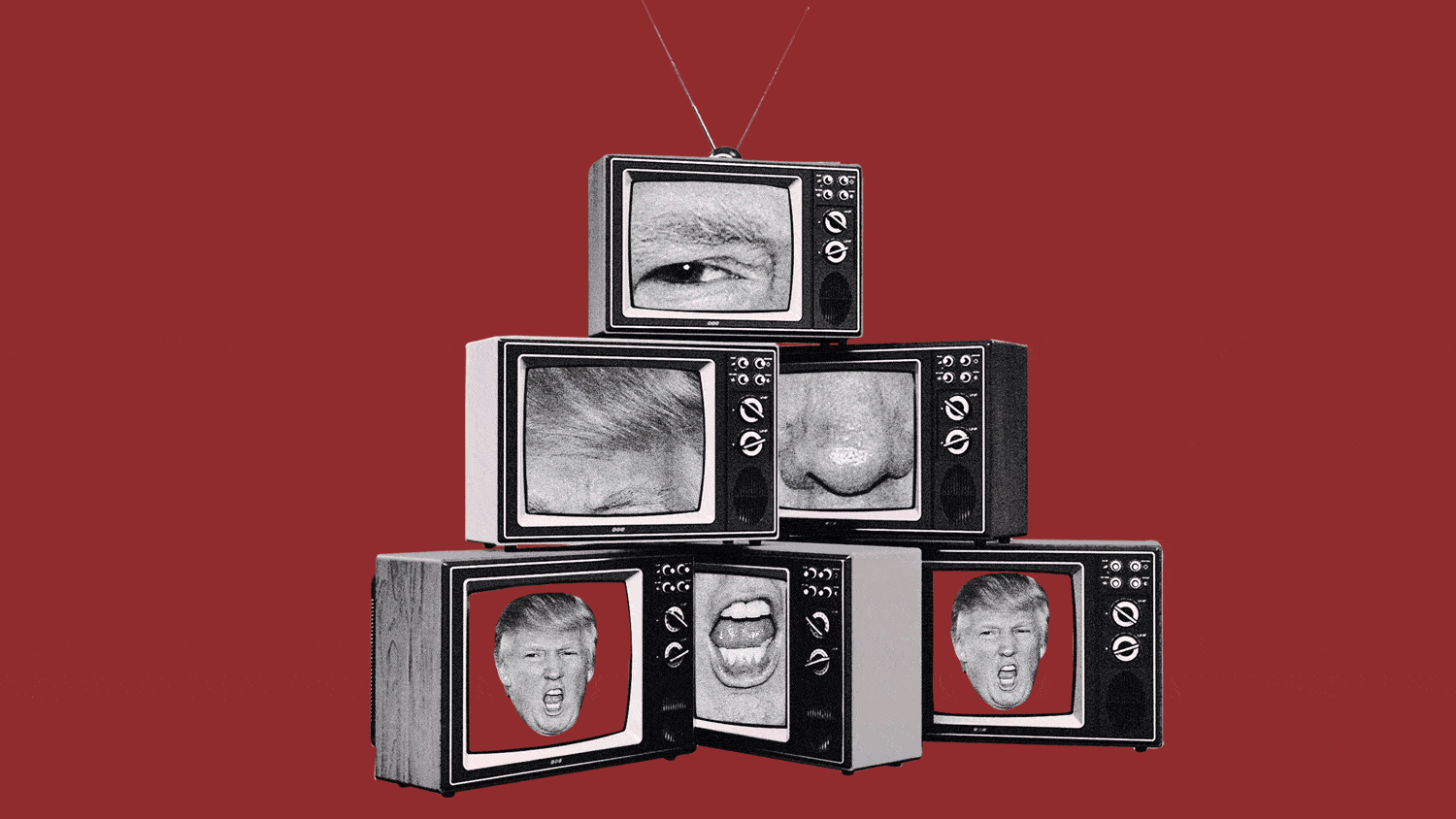At his “social media summit” Thursday, Donald Trump railed about “the tremendous dishonesty, bias, discrimination and suppression practiced by certain companies,” and how Twitter in particular was supposedly scheming to keep his followers count down. He applauded the pro-Trump meme-makers in attendance: “Some of you are extraordinary. The crap you think of is unbelievable.”
Bias among gatekeepers is a real concern, but the bigger, more fundamental problem is the crap.
Is it just me, or lately have Americans been living their lives just waiting for the other shoe to drop? You don’t have to be a sociologist to know that something is wrong with the world as we know it. Despite relative peace and prosperity, nobody really seems happy. Our culture is fraying. Our politics is coming unglued. We could probably generate a long list of factors that have contributed to this malaise and apathy. But I’m starting to wonder: Is America’s outrage machine—social media platforms, political activists and agitators, and cable news—tearing this country apart by incentivizing (and monetizing) conflict?
To be sure, we have a president who commits outrageous acts, and it’s fair to say the media has a responsibility to cover them. What I’m suggesting is that this toxic dance is all interrelated and increasingly perverse. We are being provoked and bated into a culture war by a political class and the chattering classes who have a mutually-beneficial symbiotic relationship. Unfortunately, for us—the consumers—it is also parasitic one.
Let me be clear, America is in trouble. Yes, we have been through worse. We have endured a bloody civil war, as well as unrest and riots. It seems absurd to compare modernity to those difficult days, and yet, to most Americans I talk to, things feel pretty horrible.
We are thankfully not caning each other on the floor of Congress (yet), but the daily barrage of horrific images we are subjected to makes us feel as though things have never been worse—that we have never been more divided. At some point, perception is reality.
Since many of my readers share my skepticism about our president, it might be good to put ourselves in the shoes of his base and understand the kind of daily outrage that confronts them.
Suppose you were a normal, decent, conservative-leaning American. In the past couple of weeks, you have been treated to videos of a journalist being attacked by Antifa in Portland. You have been swept up in controversy regarding Nike and Colin Kaepernick and the Betsy Ross flag. You probably saw video of female soccer stars letting the American flag fall to the ground. You saw tweets about a progressive who confronted a tourist at a D.C. barbecue joint, calling him a racist, solely because he was wearing a MAGA hat (and, in similar fashion, you heard about a progressive journalist who unfriended someone whom he had known since high school, all because she wears a MAGA hat). And you also might have heard about a Detroit music festival that charged white people double.
Now, this parade of outrage is nothing new. Indeed, this is a fairly standard week. Furors like this helped convince conservatives to vote for Donald Trump—despite all his sins—and portrayed him as a sort of hero/protector of the (conservative) masses. Then, Trump’s rhetoric and policies, no doubt, contributed to radicalizing his adversaries on the left, causing them to step up their conspicuous outrage.
This vicious cycle repeats daily.
In this milieu, it would be understandable why after a week’s exposure to this outrageous and toxic behavior, a normally mild-mannered conservative person might become angry—maybe even outraged―enough to vote to reelect Donald J. Trump.
Trump, of course, relishes this dynamic and works tirelessly to stoke and publicize divisions. But he’s not alone. Other politicians and commentators—on both sides of the aisle—do the same thing. Just as conservatives have legitimate reason for outrage, so, too, do progressives. Maybe it’s a story about kids being put in cages, or maybe it’s about an inappropriate Facebook page being run by border patrol agents. No matter your political worldview, there is plenty of material to feed your outrage. (Some very serious and legitimate stories even have something for everyone. Depending on who you talk to, the Jeffrey Epstein story is about to implicate Donald Trump—or Bill Clinton.)
So where did this dynamic all come from? Surely Donald Trump did not invent it, even though he exploits it. I believe this is the inexorable result of a technological revolution.
Once upon a time, Americans had three TV channels, a local newspaper, and a handful of national papers of record. Aside from the fact that there were “serious” gatekeepers determining what was “newsworthy,” news was seen as a public service and was limited to a certain length of time (or column inches).
Today, of course, the news never stops. What is more, news is also entertainment—meant to generate buzz, ratings, tweets, and page views. Meanwhile, random Americans have access to what is tantamount to a TV studio and a radio station—all in our pockets. Could the nation have endured “deepfake” videos and memes about Abraham Lincoln? Could Martin Luther King, Jr’s peaceful message of civil disobedience have taken root if more radical civil rights activists had taken their more militant message to Twitter?
This technological shift is the reason that none of the usual remedies and buzz words—more “understanding,” “civility,” or “reconciliation”—aren’t the answer. The answer is to put down our phones and to tune out.
Barring that (or, perhaps, an electromagnetic pulse), there is no putting that genie back in the bottle. Perhaps that is why we don’t even hear very much about how problematic this technological metamorphosis is for democracy. After all, why even discuss a fundamental problem if there is zero chance of reversing it?
Still, the consequences—for our personal happiness, as well as our national comity—are hard to overestimate. If ignorance is bliss, could it be that the reason so many of us are so unhappy—again, despite relative peace and material prosperity—has to do with us knowing too much?
Now, to some Americans, this sounds unpatriotic and almost sacrilegious. A free people, after all, have a responsibility to be well informed, they say. To which I say, the poison is in the dose—and we are overdosing on outrage, under the guise of being informed citizens. As famed Christian author C.S. Lewis once noted, “A sick society must think much about politics, as a sick man must think much about his digestion: to ignore the subject may be fatal cowardice for the one as for the other. But if either comes to regard it as the natural food of the mind–if either forgets that we think of such things only in order to be able to think of something else–then what was undertaken for the sake of health has become itself a new and deadly disease.”
Not long ago, if you turned off the TV, it’s possible you might have remained ignorant of the petty outrages of the day (see videos of disgusting people licking ice cream at grocery stores—or the recent controversy over Chinese food), while still managing to learn about a serious humanitarian crisis or horrific event. But since the advent of 24/7 cable news and social media, our daily intake of outrage has increased exponentially, and it’s hard to avoid constant triggering exposure to even most fleeting and superficial outrages of the day.
Aside from the impact on our individual morale and psyche, this behavior also affects our increasingly toxic political environment. What we have now is an unvirtuous cycle. One side of the political aisle does something to outrage us. We can’t avoid seeing it, nor can we avoid wrongly assuming that this is representative of the other “tribe.” In some cases, outrageous behavior creates a backlash, whereby we are drawn closer to our side of the political aisle. In other cases, outrageous acts spark retaliation, thus igniting a whole new round of outrage and outrage backlash.
The truth is that we are still getting used to a new technological revolution. Every time a shift like this happens, there are dramatic disruptions and dislocations. Just as the advent of the car and the birth control pill did more to bring about the sexual revolution than anything Betty Friedan ever said, the internet has changed our culture and worldview in ways we don’t fully even appreciate.
Maybe some new technology will come along to help us filter, or maybe we will simply learn to adapt to this brave new world. Or maybe this is the new normal. There’s no going back. These inexorable outrage wars are leading to greater division, polarization, and, yes, outrageous politics.
The thing to remember is that our online world is still a virtual reality. When I was a kid growing up in western Maryland, we would watch the local D.C. media market. Based on what I saw on the news, I assumed that D.C.—then the “murder capital” of America—was essentially Baghdad. Today, I realize that, though there were certainly dangerous parts of the city, the media was only presenting the bad news. Likewise, how many of us see stories about bipartisan accomplishments in Congress?
But here’s the thing to remember. Those of us who write about politics have an incentive to write things that get attention. And guess what, outrage works. Citizens reward this type of behavior. That’s why I believe the only hope is for individuals to change what we reward, thus, changing the incentive structure. This won’t be easy, since we are hardwired to reward outrage—to be tribalistic.
Still, at the end of the day, this toxic environment is our fault.
Not we the media; we the people.

